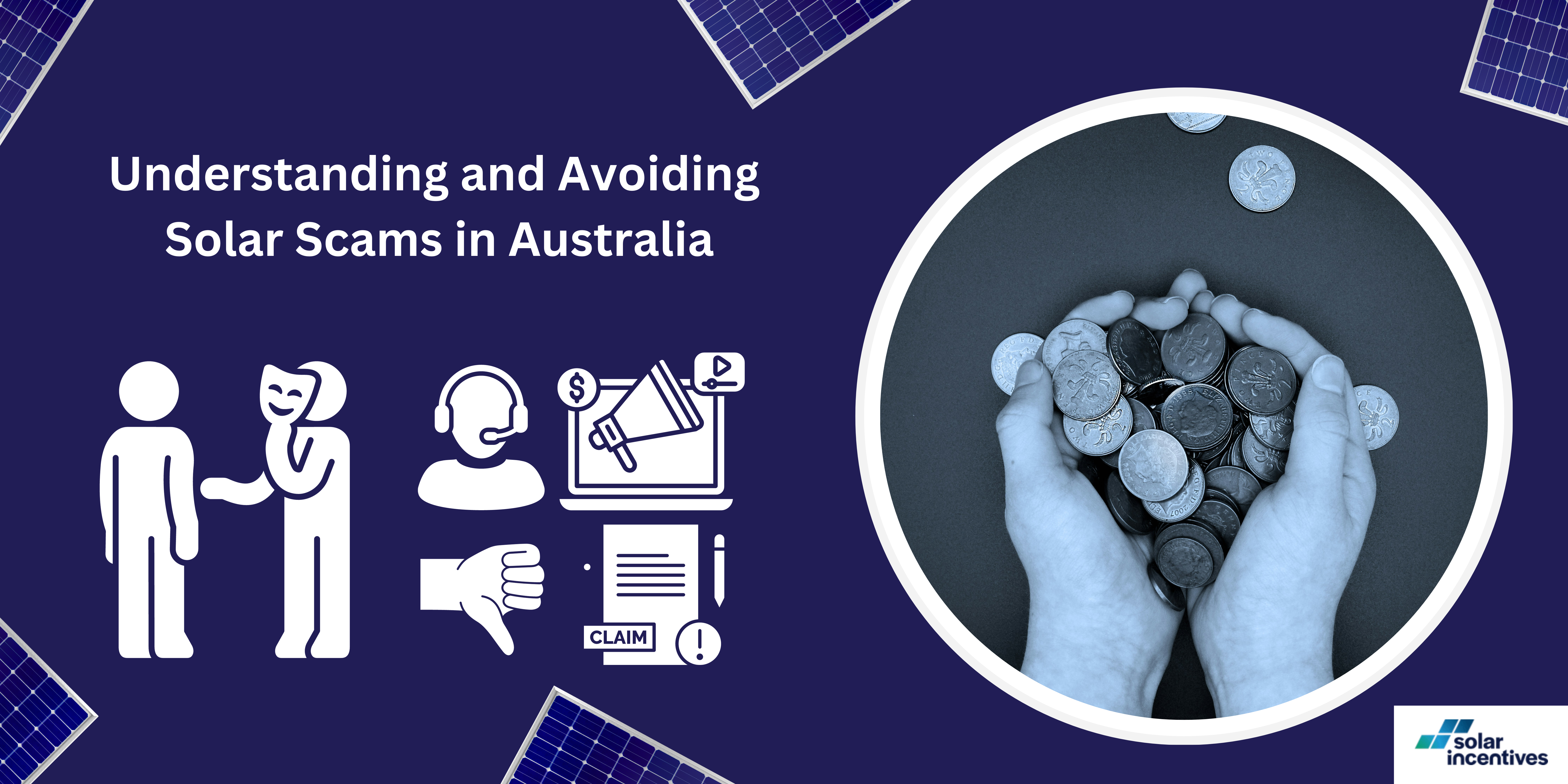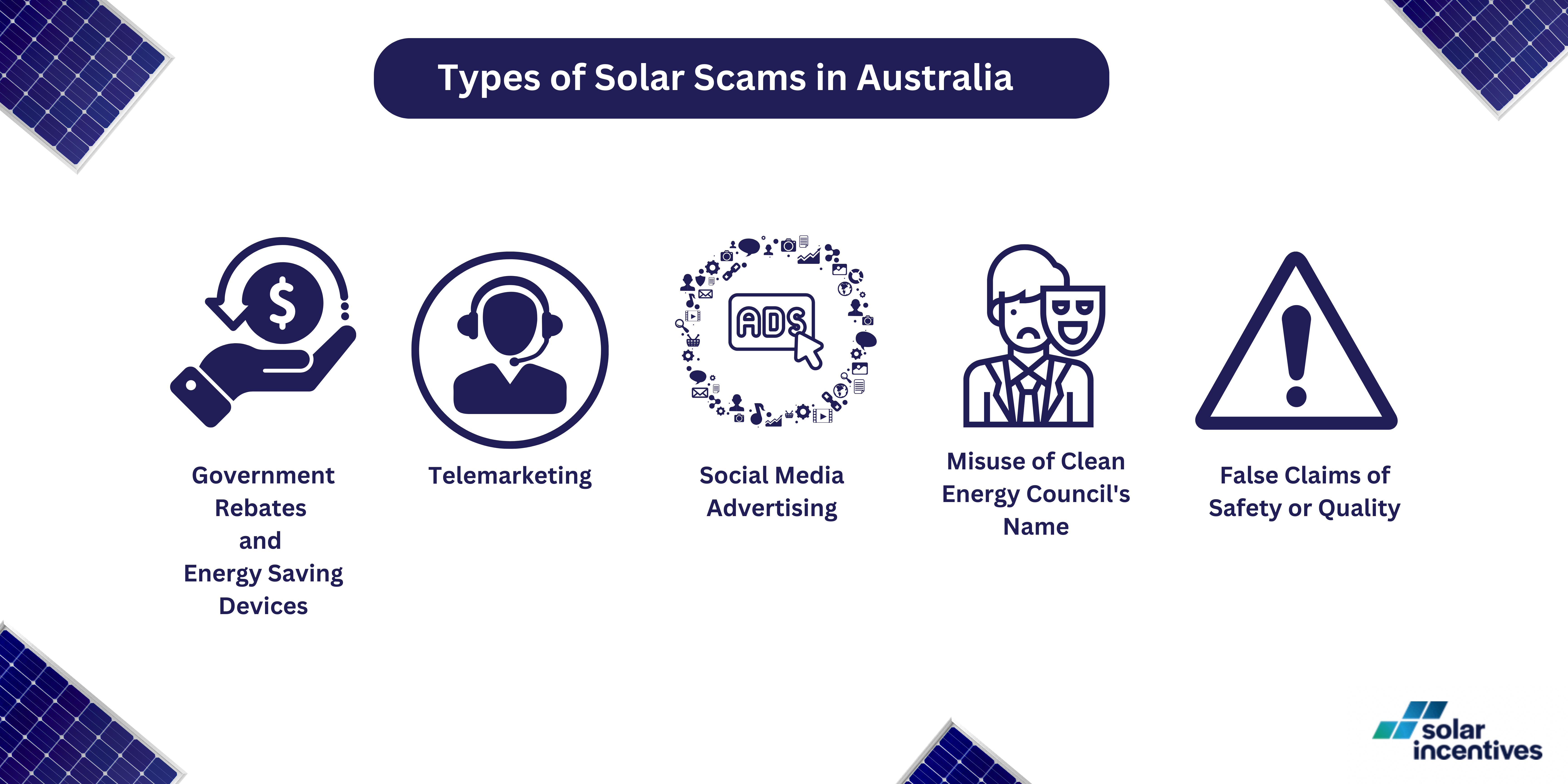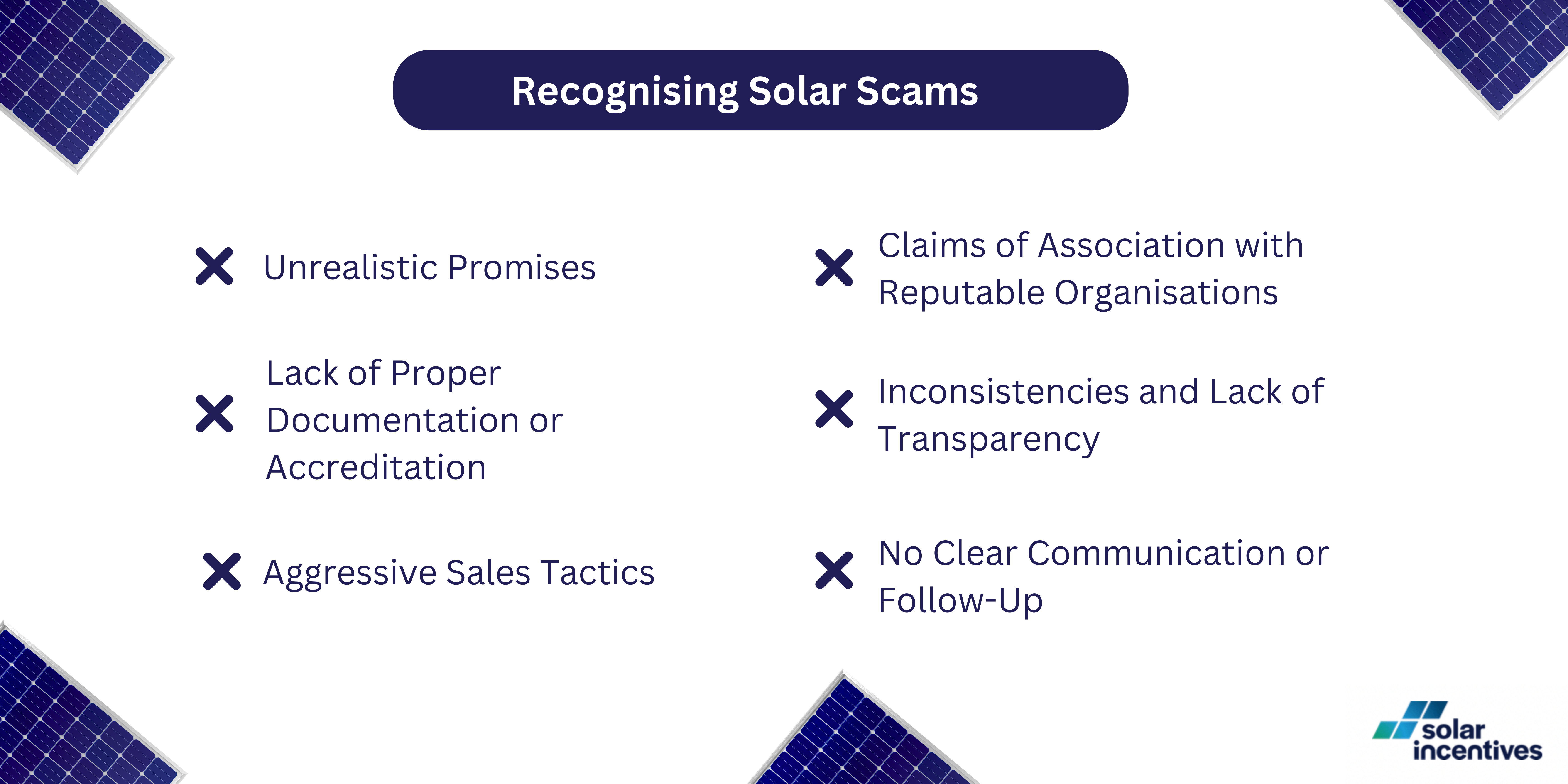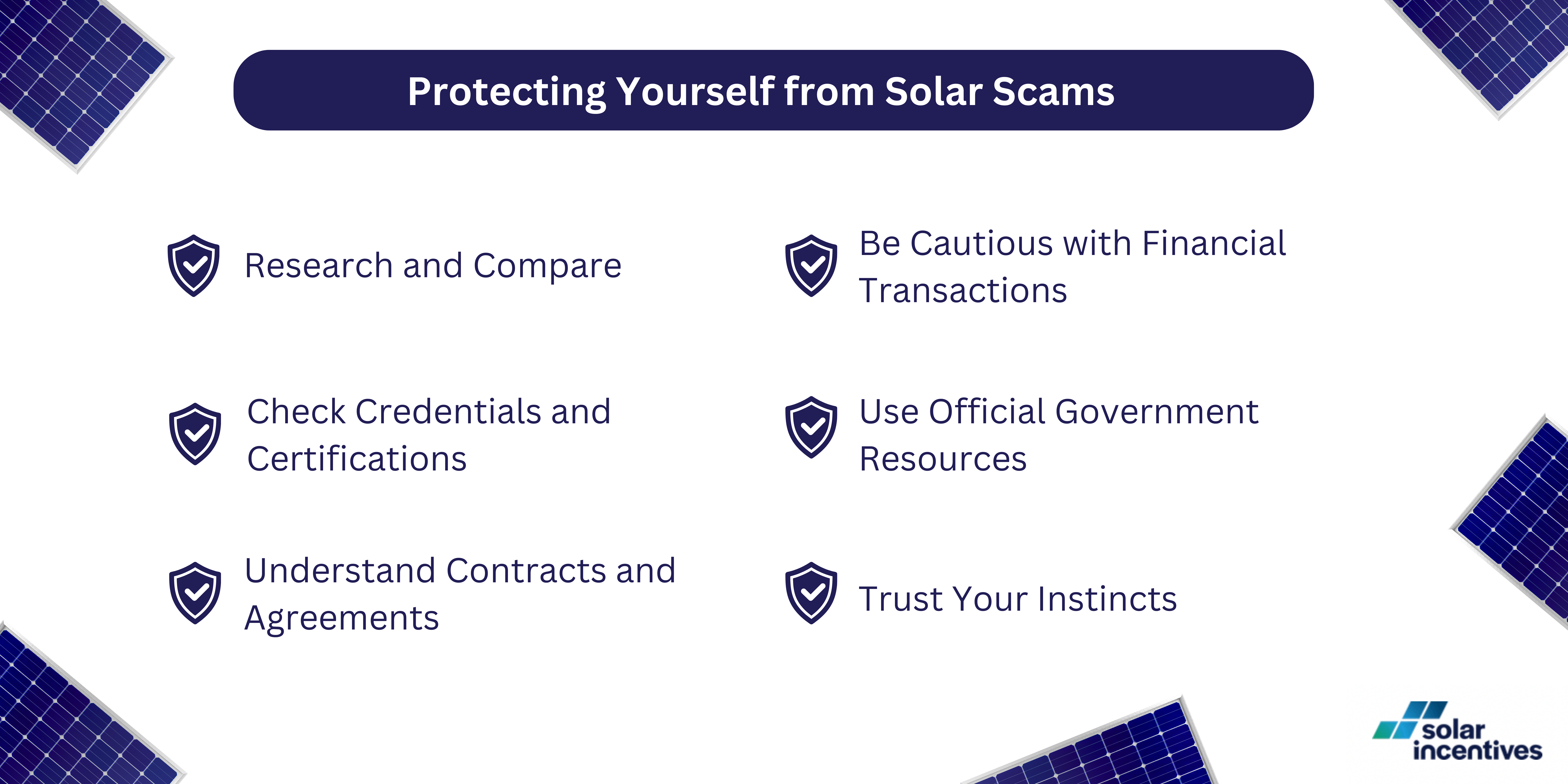Understanding and Avoiding Solar Scams in Australia

Steve Hill
Expert in Residential and Commercial Solar Solutions and Energy Efficiency
4 min read · 29th November 2023
As more Australians embrace solar energy, the unfortunate rise of solar scams is becoming a significant concern.
These scams not only mislead consumers but also cast a shadow over the legitimate solar industry. It’s essential for anyone considering solar energy to be well-informed and cautious.
In this blog, we aim to shed light on the various types of solar scams in Australia, how they operate, and their impact.
Our goal is to provide you with the necessary insights to identify and steer clear of these scams. Ensuring your solar energy journey is safe and beneficial.
Types of Solar Scams in Australia

Government Rebates and Energy Saving Devices
A common scam involves false offers of government rebates or the sale of energy-saving devices. Scammers might approach you through unsolicited door-knocking, cold calls, or high-pressure sales tactics.
They often entice consumers with the allure of free solar systems or exaggerated rebate claims.
Telemarketing
Some scammers misuse telemarketing, a legal sales channel, to promote solar products.
They may disregard the government’s Do Not Call Register, which is a red flag for their legitimacy.
Social Media Advertising
Scammers are increasingly turning to social media to advertise solar deals. These ads often promise exceptional offers but can lead to poor-quality products or services.
Misuse of Clean Energy Council’s Name
Beware of scammers falsely claiming to be associated with the Clean Energy Council. They may use fake logos or claim to represent the Council, misleading consumers about their credibility.
False Claims of Safety or Quality
Some scams involve the installation of sub-standard or unsafe solar systems. Not all scams directly imply a safety risk, but it’s vital to verify the quality and safety of any installation.

Recognising Solar Scams

Being able to recognize solar scams is a crucial step in protecting yourself. Scammers have become increasingly sophisticated, but there are still telltale signs that can alert you. Here are some red flags to watch out for:
Unrealistic Promises
- Be wary of offers that seem too good to be true, such as extremely low prices or guarantees of unusually high returns on your investment.
- Offers that claim ‘limited time only’ discounts or benefits that significantly undercut market rates can often be misleading.
Lack of Proper Documentation or Accreditation
- Legitimate solar companies will have proper documentation and accreditation. Always ask for and verify their credentials.
- Check for certifications from relevant authorities like the Clean Energy Council or other recognized industry bodies.
Aggressive Sales Tactics
- Scammers often use high-pressure sales tactics to force quick decisions. This can include insisting on signing contracts immediately or offering a ‘special discount’ that expires soon.
- Remember, a reputable company will give you time to consider your options and won’t pressure you into making an immediate decision.
Claims of Association with Reputable Organisations
- Be cautious if a company claims associations with well-known organisations without proof.
- Always verify such claims by contacting the organisation directly or through their official website.
Inconsistencies and Lack of Transparency
- Inconsistent information, whether in promotional materials, contracts, or verbal communications, is a red flag.
- Lack of transparency about the company’s background, location, or past projects should also raise concerns.
No Clear Communication or Follow-Up
- If a company is evasive in answering your questions or doesn’t provide clear, consistent follow-up, it’s a sign of potential trouble.
- Legitimate businesses will have established channels for customer communication and support.
By being aware of these red flags, you can better protect yourself from falling victim to a solar scam. It’s always better to take your time, do your research, and ensure you are dealing with a reputable solar provider.
Protecting Yourself from Solar Scams

Awareness and due diligence are your best defences against solar scams.
Here’s how you can protect yourself:
Research and Compare
Before committing to any solar provider, conduct thorough research. Compare different companies, their offerings, and reviews.
Look for testimonials or case studies from previous customers. These can provide insights into the company’s reputation and service quality.
Check Credentials and Certifications
Ensure the solar provider has necessary certifications and is accredited by relevant authorities, such as the Clean Energy Council in Australia.
Don’t hesitate to ask for proof of accreditation and check these against official databases.
Understand Contracts and Agreements
Read all contracts and agreements carefully. Be wary of any terms that seem unclear or unfair.
Don’t shy away from asking questions or seeking clarification on any point you don’t understand.
It’s advisable to get a second opinion from a legal expert, especially for large investments.
Be Cautious with Financial Transactions
Avoid paying large sums upfront. A staggered payment plan, tied to project milestones, is usually safer.
Use payment methods that offer some level of protection or traceability, like credit cards or bank transfers.
Use Official Government Resources
For information on rebates and incentives, rely on official government resources. Websites like the Australian Government’s Clean Energy Regulator provide accurate and updated information.
Be sceptical of any information that doesn’t align with official sources.
Trust Your Instincts
If something feels off about an offer or a provider, trust your instincts. It’s better to be cautious than to regret a hasty decision.
Reporting Solar Scams
If you encounter a solar scam, reporting it is crucial to help protect others. Here’s what you can do:
Contact Consumer Protection Agencies
Report the scam to consumer protection agencies like the Australian Competition & Consumer Commission (ACCC).
Provide them with as much detail as possible, including any documentation you have.
Spread Awareness in Your Community
Share your experience with friends, family, and online communities. Raising awareness is key to preventing others from falling victim to similar scams.
Consider writing reviews or testimonials to warn others.
Conclusion
The path to adopting solar energy in Australia is filled with exciting possibilities. But it also requires caution and informed decision-making.
Understanding the types of solar scams prevalent in our country and recognizing their warning signs are crucial steps in safeguarding yourself from potential pitfalls.
Australia is at the forefront of the clean energy revolution, transitioning one rooftop at a time.
This journey isn’t just about individual gains. It’s a collective step towards a more sustainable and energy-secure future. And you’re a part of this exciting movement.
If you’re considering solar energy for your home or business, it’s crucial to partner with a trusted and reliable provider. At Solar Incentives, we are committed to helping you find the right solar solutions.
Our goal is to help you significantly reduce your electricity bills and enhance your energy security for years to come.
Don’t miss out on the latest opportunities. Check out Solar Program for the most up-to-date information on government incentives. Find out how they can benefit your transition to renewable energy. Let’s make this journey together.
Article By
Steve Hill
Steve Hill has a rich background in the solar energy sector and is dedicated to empowering consumers with knowledge, particularly in residential and commercial solar solutions, solar batteries, and energy efficiency products.
Steve enjoys sharing his wealth of experience, offering practical advice, and learning about the latest trends and innovative solutions in the world of solar energy.

